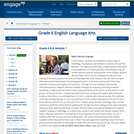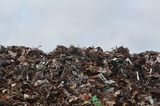
In this module, students are involved in a deep study of mythology, its purposes, and elements. Students will read Rick Riordan’s The Lightning Thief (780L), a high-interest novel about a sixth-grade boy on a hero’s journey. Some students may be familiar with this popular fantasy book; in this module, students will read with a focus on the archetypal journey and close reading of the many mythical allusions. As they begin the novel, students also will read a complex informational text that explains the archetypal storyline of the hero’s journey which has been repeated in literature throughout the centuries. Through the close reading of literary and informational texts, students will learn multiple strategies for acquiring and using academic vocabulary. Students will also build routines and expectations of discussion as they work in small groups. At the end of Unit 1, having read half of the novel, students will explain, with text-based evidence, how Percy is an archetypal hero. In Unit 2, students will continue reading The Lightning Thief (more independently): in class, they will focus on the novel’s many allusions to classic myths; those allusions will serve as an entry point into a deeper study of Greek mythology. They also will continue to build their informational reading skills through the close reading of texts about the close reading of texts about the elements of myths. This will create a conceptual framework to support students’ reading of mythology. As a whole class, students will closely read several complex Greek myths. They then will work in small groups to build expertise on one of those myths. In Unit 3, students shift their focus to narrative writing skills. This series of writing lessons will scaffold students to their final performance task in which they will apply their knowledge about the hero’s journey and the elements of mythology to create their own hero’s journey stories.
Find the rest of the EngageNY ELA resources at https://archive.org/details/engageny-ela-archive .
- Subject:
- English Language Arts
- Reading Informational Text
- Material Type:
- Module
- Provider:
- New York State Education Department
- Provider Set:
- EngageNY
- Date Added:
- 02/01/2013
